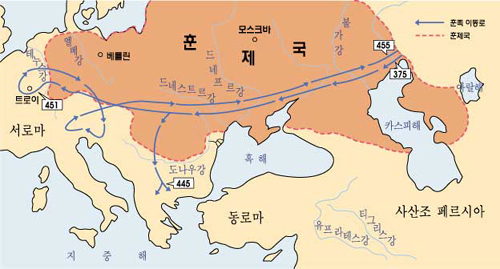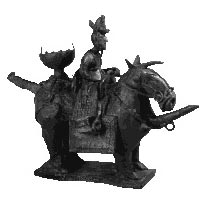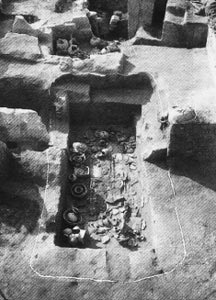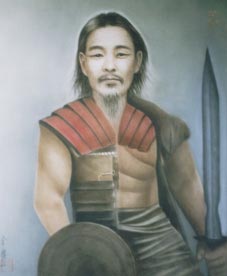 |
| 훈족의 추장 아틸라가 사망했을 당시(453년)의 훈족의 영토이다. |
훈족은 중국고대사에서는 `흉노`족이라고 한다. 한(漢)나라에 쫓겨 서쪽으로 간 흉노의 일부가 곧 훈족이라는 설에는 이론(異論)이 있다. 4세기에는 유럽으로 이동하여, 375년 흑해 북안(黑海北岸)의 동(東)고트족을 무찔러 그 대부분을 지배하에 두고, 이어서 다뉴브강 하류의 서(西)고트족에 육박했다. 서고트족의 일부는 훈족의 압박을 피하여 동(東)로마에 이주하였는데, 이것을 게르만 민족 대이동의 발단으로 간주하기도 한다. 4세기 말의 루아왕 때에는 오늘날의 헝가리 ·트란실바니아 일대를 지배했고, 다음의 아틸라왕 때에는 전성기를 이루어, 주변의 게르만 제부족을 복속시켜 흑해 북안에서 라인강에 이르는 일대제국(一大帝國)을 수립했다.
아틸라는 로마제국에 큰 위협을 주면서 다시 서진(西進), 갈리아에의 침입을 꾀하자 서로마의 장군 아이티우스는 451년 로마군(軍)과 게르만 제부족의 연합군을 이끌고 북프랑스의 카탈라우눔의 평야에서 이를 무찔러 격퇴시켰다. 그 후에도 아틸라는 이탈리아 침입을 꾀하는 등 훈족의 위협은 계속되었으나, 453년 갑작스런 죽음으로 무적의 대제국(大帝國)도 급격히 분열 ·쇠퇴하여 훈족은 다뉴브강 하류지방으로 후퇴, 타민족과 혼혈*동화되어 소멸되었다.
일반적으로 한국인들은 한민족이 세계 문명사에 기여한 점은 거의 없고, 중국 등으로부터 수혜만 받아왔다는 ‘스몰 콤플렉스(Small Complex)’를 가지고 있다. 훈족과 아틸라에 대한 보다 깊은 연구는 이러한 콤플렉스를 해소하는 데 도움을 줄 것이다.
4∼5세기경으로 거슬러 올라가보자. 서양에서는 훈족이 로마제국을 유린했으며, 동양에서는 고구려가 아시아 동북방의 광대한 영역을 지배했다. 물론 훈족은 고구려보다는 가야(변한) 및 신라(진한)와 더 가까운 관계로 추정되지만, 이들 모두는 한민족이다. 아틸라를 한민족의 선조라고 간주할 때 우리는 4∼5세기경 각각 서양과 동양에서 패자로 군림한 당당한 두 선조, 아틸라와 광개토대왕을 얻게 되는 것이다.
<편집자주>
----------------------------------------------------------------------
 |
| 경주에서 출토된 신라시대 기마인물상 토기. 북방 유목민족의 특성을 지녔다 |
The Huns and the forgotten Korean
훈족과 잊혀진 `코리안`
Europeans called them "Huns".Originating from the main land of Korea, they invade d the Roman
empire during the 4th century.
유럽인들은 그들을 "훈족(Huns)"이라고 불렀다. 본국 `고려` 땅에서 일어난 그들은 4세기경 로마 제국을 쳐들어왔다.
Ancient Greeks historian recorded them Scytians , and later European called them Mongols.
고대 그리스 역사가는 그들을 `스키타이`인(Scythians)이라고 기록했으며 이후 유럽인들은 그들을 몽골인이라고 불렀다.
Around early 4th century, the temperature fell lower than usual for many years in far East Asia. It caused grains not to ripen, grazing grass land for animals was scarce.
4세기 초, 극동아시아에서는 수년동안 기온이 평시보다 떨어지는 이상기온현상이 발생하였는데, 그로 인해 곡식은 영글지 못하고 동물들에게 풀을 뜯어먹일 수 있는 땅은 부족하게됐다.
 |
| 훈족의 유물과 비슷한 특성을 가진 금관가야의 대표적 유물이 다량 출토된 김해 대성동 고분 |
For these reasons a large number of semi-nomadic tribes left from what is known today as the Korean mainland to Eastern Manchuria.
이런 이유로 인해 상당수의 반(半)유목 종족은 오늘날 Korea라고 알려져 있는 한국본토에서 만주 동부로 떠나게 되었다.(편집자 주: 여기에서 말하는 이동은 한반도를 기준으로 했을 경우에 해당된다.)
Gathering other tribes along the way they proceeded to the Central Asiatic step. From there, the mass of tribes went westward.
그 길을 따라 이민족들을 규합하면서 그들은 중앙아시아쪽으로 발걸음을 계속했다. 그곳에서 종족 대부분은 서쪽으로 향했다.
Around AD 370 these nomadic people arrived upon the Horizon of the Roman empire. They established a kingdom along the Danube, on the prairies that are present day Hungary.
서기 370년경 이 방랑민들은 로마제국 국경선에 도착하여 다뉴브 강(독일명 `도나우강`)을 따라 현재는 헝가리 지역인 대초원위에 그들의 왕국을 세웠다.(헝가리-Hungary의 어원은 Hun에서 기원했다. 헝가리의 어린이들은 지금도 `아빠`라고 한다.)
About AD 443, Attila, the son of King Ruga assassinated his brother Bleda and united all the Hun tribes. He lead the warriors onto ruthless and savage conquests; destroying anything in sight, looting and merciless killing of innocent people.
서기 443년 경, 루가왕의 아들 아틸라는 그의 형제 블레다를 암살하고 모든 훈족을 통일했다. 그는 전사들을 이끌고 무자비하고 야만적인 정복을 감행하였는데, 눈에 보이는 것이라면 닥치는대로 파괴하고 약탈을 하였을 뿐 아니라 무고한 사람들까지도 무자비하게 살해했다.
He conquered Germany, Eastern Europe and most of southeastern Europe.
그는 독일, 유럽 동부 및 유럽 남서부 일대 대부분 지역을 정복하였다.
The Huns were superior horseman and combined with their archery skills were the bane of the Romans ......,
훈족은 기마술에 능한 이들로 궁술 또한 겸비하였는데 그것은 로마인들을 파멸시킨 큰 원인이었다
They used a short, inverted bow made from few different materials glued together. An iron arrow head was able to pierce any European armor.
그들은 서로 강하게 접착된 다른 재료들을 가지고 제작된 짧은 역궁(逆弓; 맥궁)을 사용했으며, 철로 된 화살촉은 유럽군인들의 어떤 철갑옷도 관통시킬 수 있었다.
Their horses were short in height, but had speed and endurance, they were also agile and smart.
그들의 말은 작지만 빠른 속도와 강한 지구력이 가졌으며, 그들 또한 동작이 민첩하고 영민하기 짝이 없었다.
Hun warriors, while twisting their upper body, were able to shoot arrows behind them while their horses were running forward (referring picture).
훈족의 전사들은 말이 전방으로 달리고 있는 상태에서 말위에서 상체를 뒤로 틀면서 그들 뒤편에 있는 적을 향해 화살을 쏠 수 있었다.
When Atilla was young, his father Ruga exchanged his son with a young son of a prominent Roman family , his name was Aetius.
아틸라가 어렸을 때 그의 부친 루가는 자신의 아들을 한 유명한 로마 가문의 어린 아들, 즉 그 이름이 Aetius라고 하는 아이와 바꾸었다.
For ten years Atilla was educated in the Roman court vise versa Aetius from the Hun kingdom. Atilla was probably the first western educated Mongol in its history.
십년동안 아틸라는 로마 왕실에서 교육을 받았고 반대로 Aetius는 훈족의 왕궁에서 교육을 받았다. 아틸라는 아마도 몽골족 역사상 가장 처음으로 서구 교육을 받은 인물일 것이다
Later these 2 men would confront each other in Gaul (today`s France), in 451. Atilla would go on to lose this battle and invaded Italy in 452 with Germanic tribes.
이들 두 사람은 후에 451년에 Gaul(오늘날의 프랑스)에서 서로 맞부딪히게 되는데, 아틸라는 계속해서 이 전투에 패하게 되며, 452년에는 게르만족들과 함께 이탈리아를 침략하였다
His army advanced to Venice (today`s) and negotiated with a Roman representative Pope Leo for 10 hours.
 |
| 김진삼 화백이 동양적 외모를 살려 그린 아틸라 초상화 |
그의 군대는 오늘날의 베니스로 진격하여 로마 대표 교황 Leo와 장장 10시간동안 협상을 벌였다.
All the while on horse back, Atilla received tribute from Rome, and would thereafter retreat from Italy. Pope Leo received the title "The great" from the church for his successful negotiations with Atilla.
말 위에서의 장시간 협상 공로로, 아틸라는 로마로부터 공물을 받았으며 그후 이탈리아로부터 회군하게 된다. 교황 레오는 아틸라와의 이 성공적인 협상으로 인해 교회로부터 "대제(The great)"라는 칭호를 받았다.
Atilla married to a German princess, Ideco in AD 453. After his wedding celebration he died that wedding night, possibly from alcohol poisoning.
아틸라는 453년에 독일공주 Ideco와 결혼을 하였다. 그는 불행히도 결혼식날밤에 죽게 되는데 아마도 그의 사인은 술독인 듯 하다.(암살이라는 설도 있다.)
His people dammed the Danube river and buried him in the middle of the river. They opened the dam for no one, so that none could ever find his grave.
그의 백성들은 다른 이들이 묘지를 찾지못하도록 다뉴브강을 둑으로 막았으며, 시신을 강 중앙부에 매장하였다. 그들은 그 댐을 어떤 이에게도 오픈하지 않았는데, 그 결과 그 누구도 그의 무덤을 전혀 발견할 수 없었다.
After his death, the Hun kingdom crumbled and his people scattered from the Europe. He would be known as "the scourge of god" by the Roman Empire because of his cruel acts.
그가 죽은 후 훈(Hun) 왕국은 멸망하였으며 그의 백성들 또한 유럽 여러 곳으로 뿔뿔이 흩어지게 되었다. 살아생전 잔인한 행위로 인해 그는 로마제국으로부터 "신의 천벌"이라고 알려지게 된다.
The Huns left a number of legacies in Europe especially the Ch?eau area of France, all children born there have a blue round mark in their hip as the Mongolians do today. The country of Hungary got its name from the Huns, to commemorate the Hun Kingdom.
훈족은 유럽에, 특히 프랑스 Chateau 지역에 많은 유산을 남겼으며, 그곳에서 태어난 모든 어린아이들은 엉덩이 부위에 오늘날 몽골인들과 동일한 파란 몽고반점을 가지고 있다. 헝가리라는 국명은 훈
왕국을 기념하기 위해 Huns에서 비롯된 것이다.
During the world war ll allied forces refer to Germans as Hun because of their relationship with Huns in the 4th and 5th centuries. Funeral cultures of Europe are also deeply influenced from the Hun.
세계 제 2차대전 기간중 연합군은 역사적으로 독일인들의 4세기, 5세기에 훈족과의 관련성 때문에 독일인들을 훈족으로 부른다. 유럽의 장례문화 역시 훈족으로부터 깊이 영향받은 것이다.